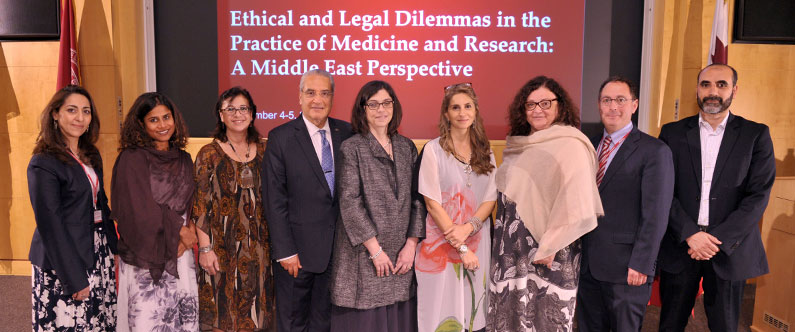WCM-Q seminar explores ethical and legal dilemmas in medicine
 Legal experts and healthcare professionals from across the MENA region and the USA convened at Weill Cornell Medicine-Qatar for a seminar on legal and ethical dilemmas in medicine.
Legal experts and healthcare professionals from across the MENA region and the USA convened at Weill Cornell Medicine-Qatar for a seminar on legal and ethical dilemmas in medicine.
Medical and legal experts from the MENA region and the USA convened at Weill Cornell Medicine-Qatar (WCM-Q) to explore ethical and legal issues that arise in the practice of medicine and biomedical research.
The two-day seminar, which looked at the law and ethics of medicine from a Middle Eastern perspective, was attended by more than 250 health and legal professionals that included nurses, pharmacists, physicians, lawyers and government employees. The event featured presentations on key issues in modern medicine, such as the ethics involved in obtaining informed consent from patients and research subjects, the moral dimensions of organ donation and transplantation, the ethics and laws relating to stem cell research, confidentiality, and Islamic perspectives of medical ethics.
The seminar was a collaboration between WCM-Q and the Salim El-Hoss Bioethics & Professionalism Program of the American University of Beirut Faculty of Medicine, and was the latest in a series of events hosted by WCM-Q that explore the intersection between law and medicine.
Dr. Sunanda Holmes, Associate University Counsel and Assistant Professor of Health Policy & Research at WCM-Q, said: “The significant advances in modern medicine in the past decade in areas such as organ transplantation and stem cell research present health professionals with great new opportunities for healing their patients, but they also present new ethical dilemmas which require a robust legal framework to protect patients, practitioners and communities. This seminar aimed to help enhance understanding of these often highly complex issues and the roles of inter-professional teams such as physicians, nurses, bioethicists, lawyers among others to further patients’ interests while taking into consideration the longer term impact of medical innovation on humanity itself.” He said:
“We have rules and procedures around consent, but these alone are not sufficient because in order for them to work they must be guided by the ethical principles of autonomous authorization and respect for persons."
“Respect for persons guides us to ensure patients and research participants have decision-making capacity to understand information, process it, use it to make a choice and express that choice. In addition, respect for persons reminds us to engage in ways that ensure that consent is given voluntarily, which can be something as simple as not watching over someone while they read the consent form. These are just some of the nuances we have to be aware of.”
 Dr. Mohammed Ghaly, Professor of Islam and Biomedical Ethics at Qatar Faculty of Islamic Studies, gave a presentation about the ethics of the physician from an Islamic perspective, based on studies of religious texts and early modern and pre-modern medical texts of the Islamic and Greek traditions.
Dr. Mohammed Ghaly, Professor of Islam and Biomedical Ethics at Qatar Faculty of Islamic Studies, gave a presentation about the ethics of the physician from an Islamic perspective, based on studies of religious texts and early modern and pre-modern medical texts of the Islamic and Greek traditions.
Dr. Ghaly said: “The concept of consent revolves around the understanding of the human body in general from an Islamic legal perspective. In this understanding, the owner of the human body is not the human himself; the owner of the human body is God and humans are trustees of their bodies. Therefore, in my capacity as the trustee of my body, nobody can intervene and interfere in my body without my consent. In contrast with Western philosophies about consent, the concept of autonomy is not mentioned at all. Nonetheless, the philosophy that the consent of the patient is mandatory and necessary is very much stressed in the religious literature.”
Also speaking at the event were Dr. Thalia Arawi, Clinical Bioethicist and Clinical Ethics Consultant at the American University of Beirut; Dr. Thurayya Arayssi, Senior Associate Dean for Medical Education and Continuing Professional Development at WCM-Q; Dr. Said Ismail, Qatar Genome Project Manager at Qatar Biobank; Dr. Bakr Nour, Professor of Surgery and Senior Adviser to the Dean of WCM-Q; Dr. Daniela Radu, Ethics and Compliance Specialist for Research and Development at Qatar Foundation; and Dr. Sunanda Holmes.
The activity was an Accredited Group Learning Activity (Category 1) as defined by the Qatar Council for Healthcare Practitioners-Accreditation Department and was approved for a maximum of 7.00 hours.
Dr. Thurayya Arayssi said:
“As healthcare in Qatar and the rest of the MENA region develops at an incredible pace it is absolutely crucial that stakeholders work closely to ensure a legal and ethical framework develops at the same time, so that the rights and wellbeing of patients, physicians, nurses and all other health professionals are protected. We are truly gratified that so many healthcare and legal professionals joined us from across the region and all over the world to help us conceptualize this framework.”